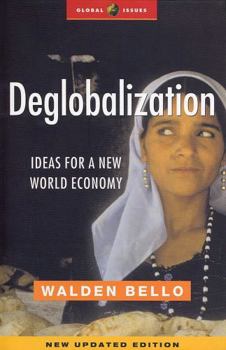Deglobalization: Ideas for a New World Economy
Select Format
Select Condition 
Book Overview
How to manage the global economy - and, more fundamentally, whether humanity wishes it to go in an ever more market-oriented, transnational corporation-dominated, and capital-footloose direction - is... This description may be from another edition of this product.
Format:Paperback
Language:English
ISBN:1842773054
ISBN13:9781842773055
Release Date:October 2002
Publisher:Zed Books
Length:144 Pages
Weight:0.30 lbs.
Dimensions:0.4" x 5.1" x 7.8"
Customer Reviews
2 ratings
Flawed critique of capitalism
Published by Thriftbooks.com User , 15 years ago
Blair talked of `bring the fruits of globalization and free trade to the many' - an admission that it benefits only the few. As one World Bank study admitted, "globalization appears to increase both poverty and inequality." Another showed that poverty grew in Eastern Europe, South Asia, Latin America, the Caribbean and sub-Saharan Africa - wherever IMF policies had been followed. Another found that most World Bank projects failed. In 1997, the IMF imposed contraction on East Asia's tiger economies, resubordinating them to the USA. Obediently, they removed limits on foreign ownership and privatised state enterprises. The effect was `to create new business opportunities for US firms', as the US trade representative boasted. The IMF did the same to Argentina in 2001, imposing brutal public spending cuts. Since 1998, the IMF has promised to reform, and changed its talk to `poverty reduction', but with the same neoliberal policies and the same Swiftly Accelerating Poverty programmes. Capitalism uses the IMF, the World Bank, the World Trade Organisation, the EU and the G8 against democracy, against national sovereignty, against the workers of the world. The alternative to capitalism's absolute decline is deglobalisation. We need to dismantle the IMF, the World Bank, the World Trade Organisation, the EU and the G8; and we need to strengthen the democratic role of the UN General Assembly. Countries want and need to reorient their economies from producing for export to producing for their local market. They want and need to shift from short-term portfolio investment and short-term loans in stock markets and real estate to long-term direct investment and long-term loans into industry and infrastructure. They want and need capital and trade controls, not just for crisis relief, but as legitimate tools of trade and industrial policy aimed at national industrial development. They want and need to subordinate the market to the human values of security, equity, social solidarity, democracy and national sovereignty Bello acknowledges that no ruling class will submit peacefully to challenges to its power. He cites the pro-capitalist Thomas Friedman of the New York Times: "The hidden hand of the market will never work without the hidden fist." Yet Bello believes that the `anti-globalisation movement' can somehow shame our rulers out of power! He ignores trade unions, the institutions that workers created to survive capitalism. And he stupidly caricatures and dismisses Marxism and Leninism, the tools workers need to defeat capitalism.
Trade über alles
Published by Thriftbooks.com User , 18 years ago
For Walden Bello, globalization is the accelerated world integration of capital, production and markets, driven by the logic of corporate profitability. It is a synonym for `trade über alles' or trade above equity, justice, environment, solidarity and community. The main headways for this globalization are the IMF, the World Bank and the WTO, who are dominated by the USA and the West and its inherent private interests, and whose policies exacerbate economic stagnation, widen inequalities and deepen poverty around the globe. For the author, genuine solidarity forces have to step in rapidly, for the alternative is a world of terrorists, demagogues of the religious and secular right and purveyors of irrationality and nihilism. His proposed remedies are drastic, revolutionary and for me at least partly utopian. They will be extremely difficult to implement: turning the IMF into a research agency with no policy powers; disempowering the World Bank by boycotting (!) its bonds; halting the WTO or reversing its mandate for liberalization of trade. On the positive side, Walden Bello wants to see a reorientation of national economies from production for export to production for the local markets, a redistribution of income and land, a global economy functioning not on market mechanisms but on democratic choice and a complete abolition of transnational corporations. Elimination of market mechanisms, a return to national autarkies, and democratic choice (permanent?, a planned economy?, giving the political and economic power in one hand?) are not very subtle solutions seeing the historical results of these policies. Drastic policy and power control changes, not reorientations, of international institutions and redistribution of wealth are more obvious choices. In this short but thought provoking book, where emotions are sometimes running very high, Walden Bello defends tooth and nail the poor and the needy against the mighty few. I also highly recommend the author's `Dilemmas of Domination'.






